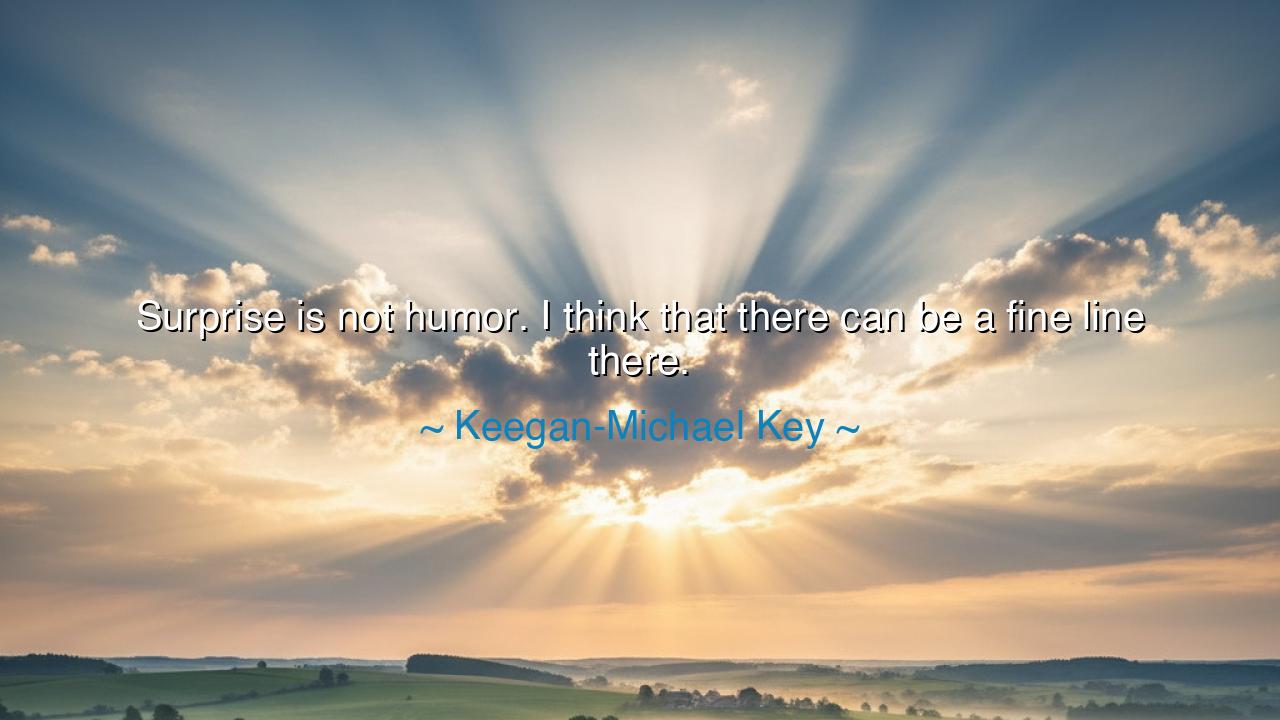
Surprise is not humor. I think that there can be a fine line






In the words of Keegan-Michael Key, “Surprise is not humor. I think that there can be a fine line there.”
Though spoken by a master of comedy, these words rise beyond the craft of laughter and into the realm of wisdom itself. Key reminds us that humor, though often born from surprise, is not its twin. The two may walk side by side, but only one carries the spirit of insight, humanity, and truth. Surprise shocks; humor enlightens. One startles the senses; the other nourishes the soul. And though the difference may seem small — a fine line, as Key says — that line marks the border between the fleeting and the eternal, between noise and meaning.
To understand this distinction, one must look into the heart of humor itself. True humor is not a trick; it is revelation. It takes the ordinary and turns it upon itself until the hidden truth beneath is revealed. The laughter that follows is not born of confusion, but of recognition. It says, “Ah, yes, I see it now — how absurd, how beautiful, how human.” But surprise, by itself, has no such depth. It merely jolts the mind without touching the heart. It may provoke a gasp, even laughter, but it leaves no lasting wisdom behind. Humor endures because it connects; surprise fades because it only interrupts.
The origin of this truth reaches back to the ancient theaters of Greece, where both comedy and tragedy were born. The playwright Aristophanes, master of satire, used humor not simply to startle his audience, but to awaken them. His laughter was a mirror — one in which Athenians saw their own vanities and follies reflected. The audience laughed not because they were surprised, but because they were revealed to themselves. It was the laughter of recognition, the laughter that follows understanding. That, Keegan-Michael Key reminds us, is the essence of true humor — it is not the sudden twist of fate, but the sudden illumination of truth.
In modern times, this wisdom still holds. Consider the works of Charlie Chaplin, whose comedy transcended words. His gags often began with surprise — a tumble, a slip, a chase — but what made them immortal was not the shock of motion, but the tenderness beneath it. When his Little Tramp stumbled, we did not merely laugh at his clumsiness; we laughed because we saw ourselves — our own fragility, our endless hope, our ability to rise after every fall. Surprise made us laugh for a moment; humor made us feel for a lifetime. Thus, Key’s “fine line” becomes the line between mere laughter and compassion, between laughter that mocks and laughter that heals.
The power of humor lies in its soul. It requires understanding, timing, and empathy — a harmony between intellect and emotion. Surprise, by contrast, is often mechanical. It seeks reaction, not reflection. This is why humor, when stripped of truth, becomes cruelty. A joke that startles but does not connect wounds rather than enlightens. The wise comedian, like the wise teacher, must know the difference. He must not only surprise his audience, but guide them to understanding. As Keegan-Michael Key teaches through his art, laughter must always be born from meaning. The finest humor is not the loudest — it is the most human.
In every art and every life, this truth holds. Surprise may be the spark that draws attention, but humor — like love, like wisdom — is the flame that sustains it. Even in conversation, in conflict, or in creation, the difference between reaction and connection determines whether we merely startle or truly touch another soul. The ancients knew this in their storytelling, just as great teachers know it in their words: that truth without tenderness can wound, and laughter without understanding can alienate. Thus, the master walks the fine line — surprising the world not to confuse it, but to awaken it.
Let this, then, be the teaching: seek humor, not merely surprise. In your speech, your art, and your life, do not aim only to startle others into attention, but to touch them with insight. Let your laughter carry truth. When you jest, let your words reveal kindness, not cruelty. When you surprise, let it lead to understanding, not disarray. For the highest humor, like the highest wisdom, leaves the heart lighter and the spirit wiser.
And so, dear listener, remember the wisdom of Keegan-Michael Key: “Surprise is not humor. There can be a fine line there.” Walk that line with care. Let your laughter be light, but never hollow; sharp, but never cruel; surprising, but always true. For the greatest humor is not the laughter that shocks the ear, but the one that stirs the soul — the laughter that reminds us that, even in life’s chaos, there is meaning, there is beauty, and there is humanity.






AAdministratorAdministrator
Welcome, honored guests. Please leave a comment, we will respond soon